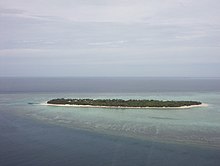A cay ( "key" English pronunciation: /kiː/) is a small, low island made of mostly sand or coral and on top of a coral reef, a very small island.

The English word cay comes from the Spanish word cayo and this from the Taíno word cayo meaning "small island".[1] The English words key and quay (which means wharf) come from the old French kai meaning "sand bank". Because it is a Taíno word, "cay" (and the other forms) are used mainly in the Caribbean, but the type of island is in tropical seas where there are coral reefs.
Sand cays are built on the edge of the coral reefs, opposite the direction from which the wind blows most of the time. Because of that, cays are often elongated. Tides and wind (and sometimes sea birds) deposit coral debris. Weather affects the formation of cays greatly. Large tides bring much more debris onto the cay and make it larger, while a hurricane destroys a cay.
Some cays are very large; Cayo Coco, north of Cuba, is about 370 km2. Those large cays are being used for tourism because they have beaches with white sand and the presence of coral reefs.
Notes and references
change- ↑ "...cayos en esta lengua son islas" ("...cays in this language are islands") Las Casas, Bartolomé de (1965). Historia de las Indias, Libro I, Cap. XL (in Spanish). Mexico: Fondo de Cultura Económica.